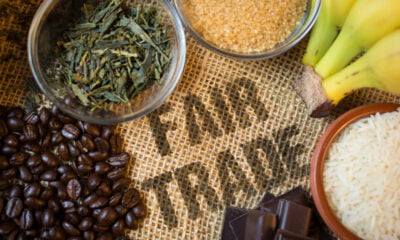

Features
Sustainable Bites: How To Make Your Diet Eco-Friendly
Environmental consciousness has become paramount with the increasing threat of global warming. Today, various initiatives are in place to help with the ongoing race against irreversible damage to our planet.
You may be surprised to hear that our diet plays a huge role in our carbon footprint. The Center for Sustainable Systems reports up to 30% of every household’s carbon footprint is caused by food.
The good news is that you don’t have to join a professional organization to help out and be more sustainable. There are many practices we can do at home to mitigate our current environmental issues. For instance, even our diet can play a pivotal role in shaping our planet’s health.
Read below to learn more about how a sustainable diet can significantly help the environment.
Reduce Waste
Many are unaware that food waste contributes to the ongoing climate change crisis. Rotting food in landfills releases methane, a greenhouse gas more powerful and damaging than carbon dioxide. Unfortunately, when released in the air, it stays for more than ten years and traps heat from the sun. The saddest part is that one-third of food produced globally is wasted, amounting to around 1.3 billion tons per year.
Additionally, when you throw away food, you waste the natural resources used for producing it, primarily energy, fuel, and water. Aside from that, if we continue to waste food, we degrade numerous plots of land to make room for more dumpsites.
When you prepare or buy your food, always consider your eating capacity. Buying on impulse will always leave you with more than you need. The key is to always purchase food before you’re starving. Otherwise, more often than not, you end up buying or making more, ultimately leading to waste.
Do Away With Plastic Packaging
It’s a known fact that plastics are one of the most notorious pollutants worldwide. Sadly, it continues to threaten the environment by spreading toxins because they’re nearly indestructible and hard to recycle.
Plastic remains vital to modern packaging, especially when wrapping our food. However, there are easy ways to reduce your plastic use and waste. For instance, you can bring a reusable bag when buying food at the market or grocery store to avoid wasting paper bags or single-use plastics. If you can, purchase packaging-free items.
Another excellent idea is to bring your own reusable container when buying takeout food. In doing so, you help reduce the demand for new single-use plastic bags and containers. Invest in a high-quality container that’s leak-proof and durable. The ideal material options are stainless steel, glass, and BPA-free plastic containers.
When bringing a reusable container, always make it accessible. That way, you’re always prepared to hand it over to those preparing your food before they can start. While many restaurants and cafes already take this initiative, some have yet to pick it up. If you encounter these establishments, always communicate with them that you prefer using your own containers.
Make Better Food Choices
Growing food requires resources like land, water, and other types of energy that significantly contribute to all global emissions. Meat, in particular, creates twice as much pollution as plant-based foods. Beef is the most resource-intensive type of meat and is the most in-demand worldwide.
Cows require more land to grow crops to feed them. The land used is also overgrazed, resulting in soil health and biodiversity decline. When the grass becomes incapable of growing and nourishing the cows, farmers will require another pasture where the cycle of overgrazing continues. It’s also worth noting that cows produce methane gas from their bodies.
Adopting more plant-based foods into your diet can help reduce the vicious cycles involved in meat production. For instance, some people now incorporate an environmentally sustainable keto diet, opting for plant-based sources of fats and proteins. These include nuts, tofu, and avocados.
If you’re unwilling to avoid meat altogether, you can ease your way into it by trying eco-friendly meat products. Many food companies use a sustainable approach to produce meat products like beef jerky to help the environment. Beef jerky is primarily a high source of protein, which is excellent for those asking, “Is beef jerky keto friendly?”
Buy from Local Markets
A few years ago, we mentioned the benefits of buying local for the planet. Local products have shorter travel distances when reaching their consumers. That means you reduce your carbon emissions by requiring less transportation if you buy from local markets. In addition, you need less energy for transportation, refrigeration, and storage, which helps mitigate environmental issues associated with food production.
Try to include seasonal produce in your diet. Familiarize yourself with your area’s locally grown fruits and vegetables and purchase them to significantly reduce your food transportation requirements. It’s also an excellent way to support local farmers.
Adopting a more sustainable diet is a small step for one person. However, if we all take these steps together, we can make a significant difference that could save our environment from the many aggressive threats it faces.






























